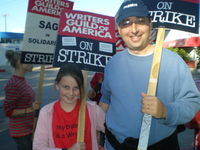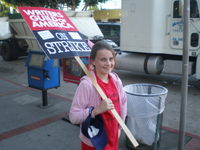Back when the WGA struck in 1988, I was a starry-eyed newcomer in television, fresh off having my first couple of freelance scripts produced. Walking the picket line each day was a chance to meet my TV writer idols and enjoy a master class in TV writing.
Nearly twenty years later, I’m pleased to report that it hasn’t changed.
Today I got to CBS Radford at 5:45 am and walked the picket line with legendary writer/producer William Blinn.
We share two social connections…when he started out in TV, his writing partner was Michael Gleason, my mentor…and he produced the TV series "Our House" with the late Ernie Wallengren, who was one of my closest friends. So I’d heard a lot about Blinn over the years from Micheal and Ernie and, of course, was well aware of his successful career in television.
The congenial Blinn and I spent the whole time talking about TV and, for three hours this morning, I was the happiest writer in Hollywood. He shared anecdotes about his early days writing for "Bonanza," "Maverick," "Gunsmoke," and "Laramie"… about writing the epic miniseries "Roots"…about writing & producing everything from "Starsky & Hutch" to little-known shows like "Lazarus Syndrome" and "Heaven Help Us"… and about working with actors like Wilford Brimley, Broderick Crawford, Michael Landon, Lee Marvin and Lou Gossett Jr. I was almost sorry when our shift ended, though my aching feet where screaming for a rest.
As far as celeb sights go, KING OF QUEENS star Kevin James showed up on the line for about twenty minutes, bought everyone Egg McMuffins and skee-daddled, but we appreciated the support and the vittles.
I had a late breakfast and caught up with the Los Angeles Times, where I was pleasantly surprised to see a very pro-WGA column from Patrick Goldstein, who noted that:
When Tom Freston was fired from Viacom in 2006 he received $60 million
in severance pay, more than all of the DVD residuals paid to WGA
members that year.[…]So why are studios playing such hardball? They say they can’t divvy up
online revenue until they have a better idea of how much money is
generated. Of course, when video came along, the studios persuaded
writers to take a tiny cut of the profits, so as not to kill an
emerging technology. But once they were accumulating windfall profits,
did they ever revisit that deal? Not on your life.
And yesterday, the LA Times profiled a soap opera writer living in Sacramento who stands to lose everything if the strike drags on much longer. Perhaps the print media is beginning to finally see our side of the story.


